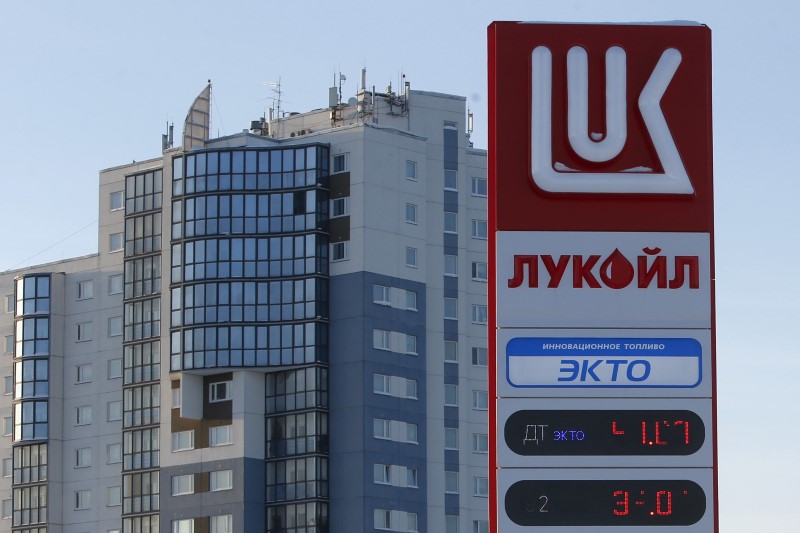By Darya Korsunskaya and Dmitry Zhdannikov
MOSCOW/LONDON (Reuters) - Oil major LUKOIL (MM:LKOH) has told the Russian government it wants to buy smaller rival Bashneft (MM:BANE) as the state prepares to sell either a controlling or minority stake in the firm to plug a budget deficit, sources told Reuters.
The government of President Vladimir Putin has ordered a privatisation drive to cover a yawning hole in its budget, which has been hit by tumbling crude prices and Western sanctions over Moscow's role in the Ukraine conflict.
The state owns 75 percent of Bashneft, which it nationalised just two years ago. It is considering whether to sell a stake of more than 50 percent, or to limit the sale to 25 percent through a stock market offering, several government and industry sources said.
"There are many parties showing interest, including LUKOIL," a government source said.
LUKOIL and Bashneft declined to comment, while the Russian economy ministry was not immediately available to comment.
LUKOIL is Russia's second-largest oil producer and its biggest private oil firm. A Bashneft sale to a private buyer would represent a significant turnaround for the world's largest energy industry, coming more than 15 years of consolidation and nationalisation which allowed the Kremlin to regain control after a chaotic privatisation in the 1990s.
It is a measure of the plight facing the budget, which could face an additional shortfall of up to 2.5 trillion roubles ($31.7 billion) this year if crude prices stay at around $30 per barrel.
State-owned Rosneft (MM:ROSN), led by Putin's closest ally in the energy sector Igor Sechin, had long been considered a front-runner to snap up Bashneft as his company has swept up a string of energy assets over the past decade and a half.
But a steep decline in oil prices combined with Rosneft's heavy debt has made the company much less acquisitive in the past two years.
The government is also considering selling stakes in Rosneft itself, which is Russia's top oil major, shipping firm Sovkomflot and diamond miner Alrosa as part of its privatisation drive.
Bashneft is Russia's sixth-largest oil firm with an output of 400,000 barrels per day. It market capitalisation stands at $4.5 billion, meaning a buyer could secure control in the producer and large refiner for less than $2.5 billion.
It used to be valued at as much as $13 billion before oil prices began to nose-dive in mid-2014 and the rouble's value also plunged.
The government had yet to decide whether to sell control in Bashneft as the economy ministry is arguing a placement in the stock market could generate more money, according to sources.
RICH AND POWERFUL
Bashneft has a history of moving in and out of state control over the past 20 years and has been a target for some of the country's richest and most influential businessmen.
It was first privatised in the 1990s, then nationalised in the last decade, before being sold to telecoms billionaire Vladimir Yevtushenkov. The oligarch later fell out with the Kremlin and was put under house arrest leading to another nationalisation of Bashneft.
Before its second nationalisation in 2014, Bashneft had been preparing for a secondary listing in London and even hired bank Morgan Stanley (N:MS) to advise on the potential secondary share placement, but the plan had to been abruptly scrapped
LUKOIL, which was created soon after the collapse of the Soviet Union, already produces as much oil as OPEC nations Angola or Nigeria. It has been relatively quiet on the acquisition front in recent years as Rosneft has grown.
The publicly listed company is co-owned by its senior management including billionaire Chief Executive Vagit Alekperov and Vice-President Leonid Fedun. Its business approach has been traditionally aimed at acquiring control in companies rather than holding minority stakes.
As a result of the sanctions over Ukraine, Russian companies have struggled to raise debt from Western markets while plans for many stock placements have been ditched. LUKOIL has been one of a small number of companies that have been able to raise money abroad in the past two years.
Rosneft is among the companies being considered in the government's privatisation drive, though Sechin said this week it would make sense to wait until oil prices recover to $100 per barrel again before selling a stake in the firm.
But the government can barely afford to postpone all privatisation projects as it presides over an economy which shrank by 3.7 percent last year and is expected to contract by another 1 percent this year.
Its new privatisation plan is expected to fetch between 500 and 800 billion roubles, potentially allowing the government to avoid additional painful budget cuts ahead of parliamentary elections set for September.
($1 = 79.2110 roubles)
